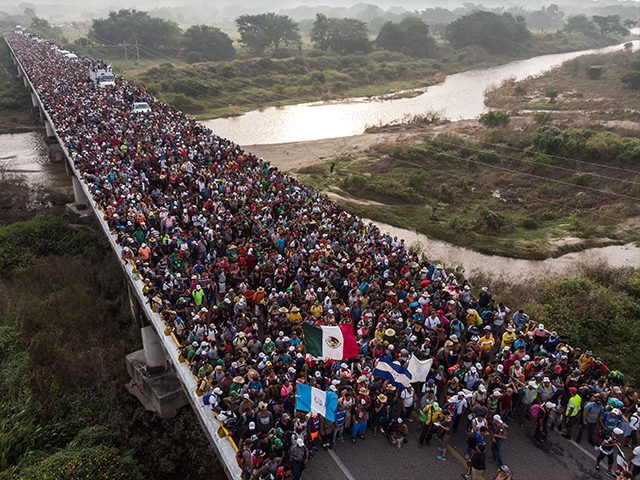Former Vice President Joe Biden’s pro-migration policies are inviting another blue-collar migration flood across the southern border, say his Democrat allies.
Biden has promised to reverse many of President Donald Trump’s pro-American policies, but “if Biden hits reverse too hard, it could cost him politically,” read a November 24 column by Noah Smith, a pro-migration columnist for Bloomberg:
In economic terms, a few hundred thousand Central American migrants will do little to hurt the U.S., but their presence will rile up law-and-order voters who bristle at the notion of people crossing the border illegally or skipping out on asylum hearings. That could hurt Biden with constituencies like Hispanic voters who live in the Texas border counties that swung hard to Trump in 2020.
“There are very real risks that sudden changes in policy could generate a surge of unauthorized migration: Recent experience has taught us that changing U.S. policies sends powerful signals to would-be migrants — and to their smugglers,” says a November 17 article by Andrew Selee, the president of the pro-migration Migration Policy Institute.
“I don’t think they’re going to be able to stop that,” said Jessica Vaughan, at the Center for Immigration Studies, which favors curbs on migration.
For example, she said, Biden has selected Alejandro Mayorkas to run the immigration system, despite Mayorkas’ role under President Barack Obama in welcoming migrants and triggering Obama’s huge Latin American migration that Trump finally stopped in early 2020.
Mayorkas will have a hard time deterring migration because millions of migrants — and their coyotes — know he wants to let them into jobs in the United States, Vaughan told Breitbart News on November 23. For example, Mayorkas pressured immigration officials to ignore fraud and to rubber-stamp migrants’ applications, she said, adding, “He said that [immigration] officers who refused applicants have black spots on their hearts and that they’re doing something wrong, and should be approving all these applications.”
The migration pressure will grow once coronavirus vaccinations allow Mexico and other regional countries to permit movement, warned Joseph Chamie, a population expert and a former director of the United Nations Population Division. He wrote on November 19 in TheHill.com:
Whether you’re for it, against it or indifferent about it, the migration surge is coming. Millions of men, women and children in developing countries are desperately seeking to emigrate to escape poverty, hunger, unemployment, violence, crime, human rights abuse, and environmental crises.
…
With the incoming government’s proposed changes to immigration policies, especially with respect to asylum seekers, undocumented migrants, migrating families and unaccompanied minors, a big migration inflow along the U.S southern border should not come as a surprise.
The coming surge of migrants can be expected to overwhelm immigration systems, including border control, security vetting, the courts, legal representation, medical clearance, shelter and quarantine facilities and operating costs. Particularly challenging for the authorities is deciding on how best to deal with migrating family units, unaccompanied minors and asylum seekers.
Biden will try to chart a course between his many pro-migration allies — including the many millions of foreigners who want to get into the United States — and millions of worried swing-voters, according to Smith.
Smith — who accepts the claim that Biden sincerely tried to exclude migrants when he was serving as vice-president — wrote November 24 that Biden:
will probably try to accept asylum seekers from Central America at a slow and ordered pace. Detention will probably persist, in a much more humane form. And Biden may even negotiate new, though less rigid, agreements to keep some asylum seekers at home as the administration tries to improve living conditions in those countries.
But the Democrats are eager to welcome more migrants, said Vaughan, and they know how to hide that unpopular welcome under loud promises to fix a “broken immigration system”:
Many people like to complain about an immigration system that is supposedly “broken,” but it’s not broken at all when someone like Mayorkas is at the helm and can [annually] wave in more than a million legal immigrants, nearly a million guest workers, and crank out a million work permits. That’s not broken — that’s working pretty well if what you want is unlimited immigration.
Under Obama and Biden, administration officials carefully opened many small and hard-to-see loopholes in the border — and disarmed border agencies with many other regulations. That covert policy gradually and deliberately let millions of blue-collar Latin Americans into the United States, so boosting business allies.
But the inevitable pressure from millions of would-be migrants flooded their stealthy pro-migration policies, causing a popular pushback in 2014 that set the stage for Trump’s surprise jump into presidential politics.
Like other white-collar pro-migration activists, Selee’s favored solution to the migration problem is to make it legal, regardless of the predictable impact on blue-collar Americans.
He would expand the legal inflow of foreign workers, asylum seekers, and refugees that will cut blue-collar wages and raise blue-collar housing prices, saying:
First and foremost, this new [migration] architecture needs to include some sort of labor pathway for Central Americans to do seasonal work in the United States.
…
identifying those in danger in their home countries either for protection in-country or for resettlement as refugees in the United States and other countries, efforts that are done on a small scale already but could be vastly expanded with the right attention and resources.
“[A] Biden administration can transition towards a new migration management architecture that creates opportunities for seasonal work and humanitarian protection, while investing in a better future for the region as a whole,” Selee concluded.
Rasmussen shows that some post-Trump Biden voters are feeling freer to protect blue-collar Americans from cheap-labor migration.
That's decent, but it may not matter if legislators think those Biden voters can be pushed to back pro-amnesty Dems in 2022. https://t.co/VSPGVnkDim— Neil Munro (@NeilMunroDC) November 25, 2020

COMMENTS
Please let us know if you're having issues with commenting.